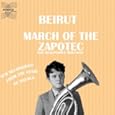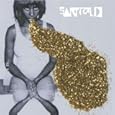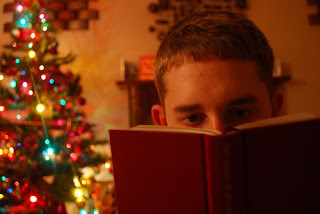Monday, April 20, 2009
Emily Haines - "Help, I'm Alive"
Monday, April 13, 2009
Do You Ever Crave Books?

I locked myself out of my house for a few hours the other day and randomly picked up a used copy of "The Golden Compass" at the store to pass the time until more responsible people (with keys) happened by. I hadn't read the series in a few years and had forgotten about it until a customer came in looking for them. A little young adult fantasy seemed like just the thing to make an otherwise irritating afternoon go by.
The problem, you see, was that I only had the first book in the series.
Monday, March 16, 2009
Nibbles: Edgar Sawtelle, Beirut, and more...





Monday, February 23, 2009
Musing: On the Responsibilities of the Author
 I'm almost finished reading Finding Beauty in a Broken World by Terry Tempest Williams, and I thought I'd throw out a topic that has come up for me while reading it:
I'm almost finished reading Finding Beauty in a Broken World by Terry Tempest Williams, and I thought I'd throw out a topic that has come up for me while reading it:Monday, February 16, 2009
Shorty Reviews: Origin, Samaritan, Twilight, and Finding Beauty in a Broken World
Saturday, January 31, 2009
Between Books...
 It's nice when the literary stars align so that you finish one book and the next one is right there waving its hand wildly in the air saying, "Pick me! Pick me!" But just as often (probably more often) you finish your book with a satisfied sigh, look up to find the next one, and...nothing. Crickets...crickets...
It's nice when the literary stars align so that you finish one book and the next one is right there waving its hand wildly in the air saying, "Pick me! Pick me!" But just as often (probably more often) you finish your book with a satisfied sigh, look up to find the next one, and...nothing. Crickets...crickets... Thursday, January 29, 2009
February Book Group: The Animal Girl by John Fulton

Next meeting: Wednesday February 25 at 7pm
In our ongoing effort to support local writers, we have chosen The Animal Girl, a short story collection by J.P. writer John Fulton, as our next book group pick. While we typically discuss novels (and, once in a blue moon, non-fiction), here we give a much-deserved nod to the art of the short story.
I continue to be puzzled by the short story's relative lack of popularity, given how amendable it is to our busy lifestyles.
Consider the challenges faced by the short story writer:
- Forget grabbing the reader with the opening chapter; you better grab them with the opening paragraph, or sentence!
- The novel affords the writer the luxury of character development, which is why so many readers prefer that form--you get to know a character, often over the course of many years (of their life, not yours!). The short story writer only has time for a snapshot or two.
- The short story writer doesn't have the luxury of putting their hero through a gauntlet of varied experiences and reversals of fortune; the plotting must be accomplished with great precision and economy.
Given these challenges, the short story writer must excel at his or her craft in order to pull the reader in, and make the reader care. A well-written short story is like a breath of pure oxygen, in that it distills basic truths with a minimum of words.
From the back cover, here is a brief description of Animal Girl: "Here are people in extremis, struggling mightily, and often failing, to keep it together. These powerful stories approach the often sentimentalized subject of romance with tenderness and insight into the heart-worn perspective of characters who have failed at love in the past. In lucid, revelatory prose, Fulton navigates the complexity of both mid-life courtship and adolescent rage with humor and intelligence."
Sounds to me like perfect Valentine's Day reading.
If you haven't tried (or liked) short stories before, we hope you'll give this collection a try. If you're interested in delving deeper into the world of the short story, we have a number of other stellar collections on hand to recommend, including Why the Long Face? by another local writer, Ron MacLean.
We hope you can join us for the discussion...
Monday, January 26, 2009
One (ok, Two) Trends in Fiction...To Which We're Ready to Wave Goodbye
 Things happen in trends. Skinny jeans, sweet-voiced British singers, foie gras - point is, it's natural. It doesn't necessarily mean that the folks at the beginning of the trend were geniuses or that those at the end are unoriginal (necessarily).
Things happen in trends. Skinny jeans, sweet-voiced British singers, foie gras - point is, it's natural. It doesn't necessarily mean that the folks at the beginning of the trend were geniuses or that those at the end are unoriginal (necessarily).Wednesday, January 21, 2009
Excited For...Dark Was the Night
 We just got a sampler for this new CD at the store and I've been playing it kinda sorta non-stop.
We just got a sampler for this new CD at the store and I've been playing it kinda sorta non-stop. Wednesday, January 14, 2009
Crooners: What's in a Name?
 Perhaps you can help settle something for me. See, my fiance and I are in a heated debate over what, exactly, defines a crooner. Yes. Laugh all you want, but this is a Serious Argument. Evidence has been presented. Positions have been stated. Resolution is not in sight.
Perhaps you can help settle something for me. See, my fiance and I are in a heated debate over what, exactly, defines a crooner. Yes. Laugh all you want, but this is a Serious Argument. Evidence has been presented. Positions have been stated. Resolution is not in sight.Saturday, January 10, 2009
Book Review: The Spirit Catches You and You Fall Down By Anne Fadiman
Throughout the story of Lia Lee’s illness and her progress through the American medical system, Fadiman ties in details on the history of the Hmong people, explanations of their medical and spiritual beliefs, and explorations of their community relationships. She makes no attempt to rationalize or otherwise “Westernize” Hmong behavior, and often outright admits that she remains baffled on several points. Instead, Fadiman lays everything out as best she can, supplementing snippets of interviews and excerpts from books and articles where needed, and gives guidance on how to best understand the information. Fadiman is fair in her portrayal and examination of both American culture and Hmong culture: she praises and criticizes both with equal measure, pointing out the strengths and weaknesses of each.
Beyond the content itself, Fadiman’s skills as a writer are what bring this story to life and give it the authority needed to carry through with such a difficult, complicated subject. Her pace throughout the book is steady, pulling the reader forward at a stately progress that is never so slow the reader loses interest, but not so fast that details are lost in a blur. Fadiman’s voice throughout is firm and respectful. She is confident of her facts and her research, but not assumptive or overly didactic. Fadiman is also clear in her goals for the book and doesn’t overreach herself (as other books of this genre sometimes attempt) by trying to create a singular text on Hmong culture and history—the bibliography at the back gives an eager reader plenty of material to continue their edification.
Whatever your cultural background, it’s easy—no, that’s not the right word—it’s natural to accept behaviors from within your own cultural without question. You grew up with these behaviors and ways of thinking. Even basic things like looking before you cross the street and knocking before entering a person’s house are ingrained behaviors. In The Spirit Catches You and You Fall Down, Anne Fadiman asks the reader to make an effort to examine and identify those ingrained behaviors and assumptions, whether from an American background, a Hmong background, or any other background. It is not (always) necessary to change our behavior or to ask another to change their behavior; the simple act of becoming aware of our own assumptions and increasing our sensitivity of other people's and other culture's assumptions will ultimately help to bridge cultural gaps and make it possible to find common ground.
Wednesday, January 7, 2009
Happy New Year from Rhythm & Muse!
 Hello and Happy New Year!
Hello and Happy New Year!